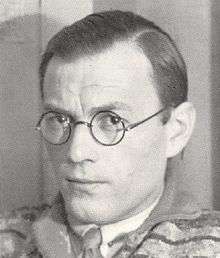Paul Schuitema
| Paul Schuitema | |
|---|---|
 Paul Schuitema | |
| Born |
Geert Paul Hendrikus Schuitema 27 February 1897 Groningen |
| Died |
25 October 1973 Wassenaar |
| Nationality | Dutch |
| Known for |
Typographer, Industrial designers |
Geert Paul Hendrikus Schuitema (February 27, 1897 in Groningen - October 25, 1973 in Wassenaar) was a Dutch graphic artist. He also designed furniture and expositions and worked as photographer, film director, painter and teacher for publicity design at the Royal Academy of Art in The Hague.
Industrial Design
Schuitema studied at the Academie voor Beeldende Kunsten in Rotterdam. In the 1920s, he began to work on graphic design,[1] applying the principles of De Stijl and constructivism to commercial advertising. Along with Gerard Kiljan and his famous colleague Piet Zwart, he followed ideas pioneered in the Soviet Union by El Lissitzky and Rodchenko, in Poland by Henryk Berlewi and in Germany by Kurt Schwitters.[2]
During his employment at the NV Maatschappij Van Berkel Patent scale company in Rotterdam, Schuitema gained recognition for his original designs of stationery and publicity material, often using only the colors black, red and white and bold sans serif fonts. From 1926 on, he started working with photomontages, becoming one of the pioneers of this technique in the field of industrial design.[1]
Even though he was a convinced socialist and often designed leftist publications directed at industrial workers, Schuitema also worked for major companies, such as Philips.[1]
Post-war Filmmaker
During the final years of World War II, Schuitema, along with Jan Bouman, Lou Lichtveld and Eduard Verschueren, began planning for the post-war art community in the Netherlands. In 1944, the four publish a "Report on Stimulation, Development and Organization of the Film Industry in the Netherlands" (Rapport inzake de stimuleering, ontwikkeling en ordening van het Filmwezen in Nederland).
Following Dolle Dinsdag (September 5, 1944), he officially joined the resistance forces, assuming a leadership role in the National Film and Photo Reportage Service. After the end of the war, Schuitema and his three partners founded the Dutch Cooperative for Film Production (Nederlandse Werkgemeenschap voor Filmproductie, NWF) in Haarlem and gave the impulse for the formation of the Dutch Film Makers Guild (Beroepsvereniging van Nederlandse Cineasten). In each case, membership was restricted to those artists whose conduct during the occupation was irreproachable. [3]
In 1946, Schuitema presented his short film "Les Ponts de la Meuse" at the Cannes Film Festival.
Influence
His techniques influenced the Wild Plakken design collective of the late 20th century.[4]
See also
Literature
Dick Maan, Paul Schuitema. Visual Organiser (englisch edition), 010 Publishers, Rotterdam (2006) (ISBN 978-90-6450-600-0)
References
- 1 2 3 "Paul Schuitema (1897-1973)" (in Dutch). AbsoluteFacts.nl. Retrieved 2006-05-19.
- ↑ "Pioneers of Modern Dutch Typography". Association for International Display of Art. Retrieved 2006-05-19.
- ↑ "The Documentary cinema 1945-1965". Beeld en Geluid. Archived from the original on 2006-09-07. Retrieved 2006-05-19.
- ↑ Max Bruinsma. "Official Anarchy - Dutch Graphic Design". Retrieved 2006-05-19.
External Links
- Finding Aid for Graphic designs of Paul Schuitema, 1920-1965, Getty Research Institute